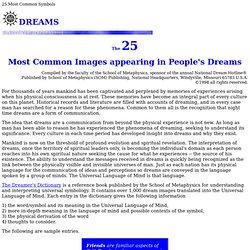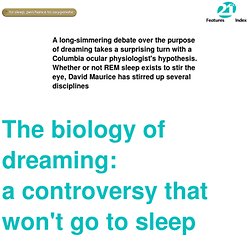

Dream meanings and the Subcontious mind. Spanking To dream that you are spanking someone suggests that you need to work on your childish rage and tantrums.

Sparrow To see a sparrow in your dream represents inner dignity. Never underestimate something that may be seemingly small or weak. 25 Most Common Symbols. 25 Most Common Symbols The 25 Most Common Images appearing in People's Dreams Compiled by the faculty of the School of Metaphysics, sponsor of the annual National Dream Hotline® Published by School of Metaphysics (SOM) Publishing, National Headquarters, Windyville, Missouri 65783 U.S.A.

Top 10 Amazing Facts About Dreams. Facts This afternoon I had a (very rare) nap.

The biology of dreaming - StumbleUpon. O one would normally consider David Maurice, Ph.D., professor of ocular physiology in the Department of Ophthalmology at Columbia-Presbyterian Medical Center, a revolutionary.

Nevertheless, he has reignited a decades-long controversy that could spark a revolutionary re-evaluation of an entire field of behavioral research. Dr. Maurice has developed a startling new line of scientific inquiry that, when added to other findings, could change our understanding of rapid eye movement (REM) sleep and the nature of dreams. What Maurice has done is to suggest an alternative explanation for the phenomenon known as REM sleep, the stage in which the eyes rapidly move and most dreams occur. Dreams: Night School. The Dream Robbers What happens when a rat stops dreaming ?

In 2004, researchers at the University of Wisconsin at Madison decided to find out. Their method was simple, if a bit devilish. Step 1: Strand a rat in a tub of water. In the center of this tiny sea, allot the creature its own little desert island in the form of an inverted flowerpot. In this uncomfortable position, the rat is able to rest and eventually fall asleep. Step 2: After several mostly dreamless nights, the creature is subjected to a virtual decathlon of physical ordeals designed to test its survival behaviors. The dream-deprived rats flubbed each of the tasks. The surprise came during Step 3. 10 Things You Probably Didn't Know About Dreams. Anyone else ever communicate with the dream?

I don't mean talking in the dream, of course everyone's done that. When I was a kid, I had a recurring nightmare about a disembodied voice and a descent into nothingness (pretty common). Anyway, I eventually learned that it was a dream. As such, I realized that if I screamed in the dream, I'd wake myself up because, even if I knew it was a dream, it was still damn scary. That went on for a couple of times until I got cocky — I laughed at the disembodied voice, telling it that I could wake up whenever I wanted. It was just weird, though — I knew it was a dream and the dream knew it was a dream, and we both communicated that fact within the dream. As for the list, pretty interesting.
Black and white TV generation have monochrome dreams. The Evolution of REM Dreaming. New studies reveal that more animals are dreaming than we thought.

In fact, all mammals and birds have REM, and if J.M. Siegel is correct, reptiles may have REM as well. REM, or Rapid Eye Movement sleep is a regularly occurring stage of sleep in which, when people are awakened and asked, dreams are often reported. In this stage of sleep, which occurs about six times a night for an average of twenty minutes each, our eyes move under our eyelids as if we were awaking and scanning some scene, hence the designation Rapid Eye Movement sleep. After the 1953 discovery of REM in humans by modern science, researchers began testing other species for REM and searching for signs of dreaming in all kinds of creatures. A theory developed that dreaming was an evolutionary advance to keep the mammalian brain warm and alert and to not let it sink too deeply into inactivity.
Who's dreaming the most? Sleep itself is somewhat different for every species. J. Just what this means is unclear. Conclusions. 5 mind-bending facts about dreams. When your head hits the pillow, for many it's lights out for the conscious part of you.

But the cells firing in your brain are very much awake, sparking enough energy to produce the sometimes vivid and sometimes downright haunted dreams that take place during the rapid-eye-movement stage of your sleep. Why do some people have nightmares while others really spend their nights in bliss? Like sleep, dreams are mysterious phenomena. But as scientists are able to probe deeper into our minds, they are finding some of those answers. Here's some of what we know about what goes on in dreamland. 1. As if nightmares weren't bad enough, a rare sleep disorder — called REM sleep behavior disorder — causes people to act out their dreams, sometimes with violent thrashes, kicks and screams. 2. Staying up late has its perks, but whimsical dreaming is not one of them.
In the study 264 university students rated how often they experienced nightmares on a scale from 0 to 4, never to always, respectively.